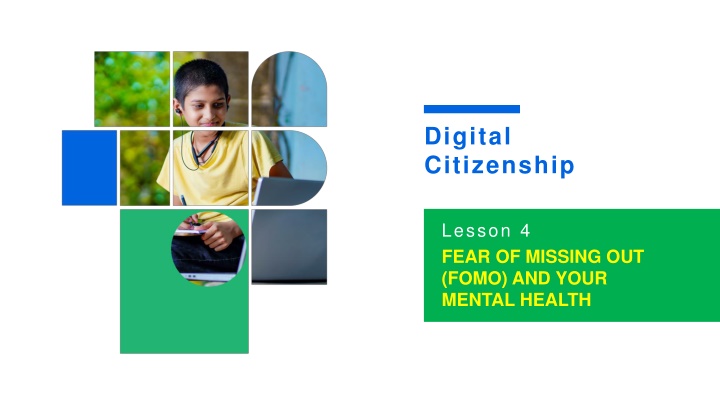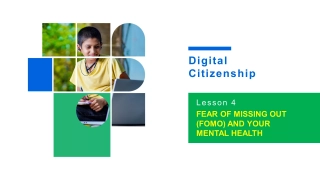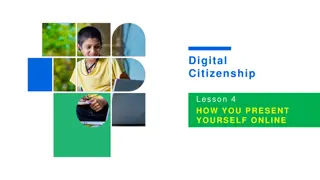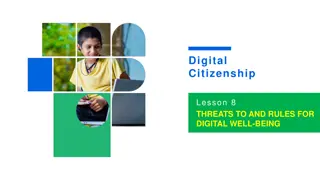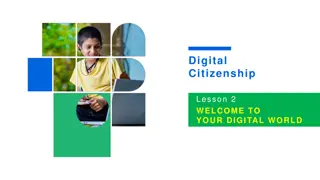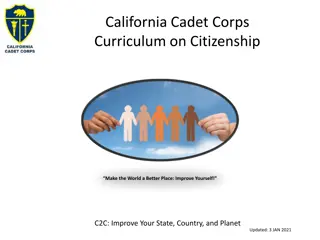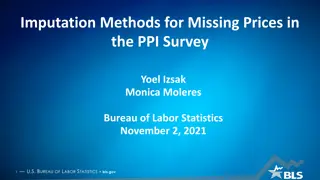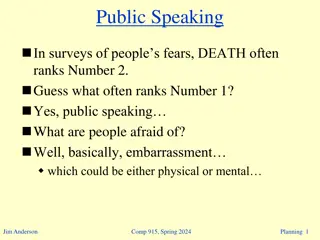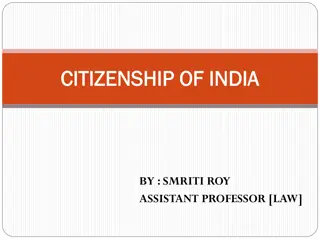Digital Citizenship.Lesson 4 FEAR OF MISSING OUT (FOMO) AND YOUR MENTAL HEALTH
Explore the concept of Fear of Missing Out (FOMO) in the digital age, focusing on how it affects mental health. Follow the story of Ananya and Teena, delving into the pressures of social media and the disparity between real life and online personas. Reflect on the importance of managing screen time and cultivating healthy digital habits for overall well-being.
Download Presentation

Please find below an Image/Link to download the presentation.
The content on the website is provided AS IS for your information and personal use only. It may not be sold, licensed, or shared on other websites without obtaining consent from the author.If you encounter any issues during the download, it is possible that the publisher has removed the file from their server.
You are allowed to download the files provided on this website for personal or commercial use, subject to the condition that they are used lawfully. All files are the property of their respective owners.
The content on the website is provided AS IS for your information and personal use only. It may not be sold, licensed, or shared on other websites without obtaining consent from the author.
E N D
Presentation Transcript
Digital Citizenship Lesson 4 FEAR OF MISSING OUT (FOMO) AND YOUR MENTAL HEALTH
Level 3 | Digital Citizenship Time Online What is your average screen time in a day, not including schoolwork? What is your estimate? What do you spend most of your online time on? How much time do you think the average teen in India spends online compared to the average cited in the US? Did You Know? US teens spend an average of more than seven hours per day on screen media for entertainment, and tweens (10-12 years) spend nearly five hours - not including time spent using screens for school and homework. Lesson 4: Fear of Missing Out (FOMO) and Your Mental Health 02
Level 3 | Digital Citizenship Level 3 | Digital Citizenship FOMO FOMO Lesson 4: Fear of Missing Out (FOMO) and Your Mental Health 03
Level 3 | Digital Citizenship Childhood Friends Ananya and Teena When they were growing up, Ananya always looked up to Teena, the older girl from the flat just opposite hers. They were often together, riding bikes, having sleepovers, laughing, and having a good time. The older Teena got, the more Ananya could see her personality changing. She often seemed stressed about becoming popular at school, something that had never bothered her when they were younger. They spoke less and less as time went by. Ananya would often see Teena s social media where she was constantly posting pictures and selfies claiming to have been to fabulous parties or gone on shopping sprees, events that Ananya knew never happened. One day, Ananya decided to go see Teena as she was worried about her friend. Teena looked so tired and worn out, not at all how she looked even two years back. After a long conversation, Teena admitted that she was suffering. She wanted to be popular, to keep up with the others at school who do these fabulous things. She didn t want to feel left behind but she was more miserable than ever. She could barely sleep at night and her grades had been suffering too. Lesson 4: Fear of Missing Out (FOMO) and Your Mental Health 04
Level 3 | Digital Citizenship Discussion Why would Teena make up stories to post on social media? Is she suffering from FOMO? Do you have a difference between your real life and what you post on social media? Lesson 4: Fear of Missing Out (FOMO) and Your Mental Health 05
Level 3 | Digital Citizenship Level 3 | Digital Citizenship Reflections social media and friendship. Lesson 4: Fear of Missing Out (FOMO) and Your Mental Health 06
Level 3 | Digital Citizenship Reflections Do you spend time online with friends even when you are sitting next to one another? Explain. What are the kinds of stories that you post on social media? Do you try to make everything seem amazing ? With tagging, are you tagging all the friends who are in your photos or posts? Have you ever left someone out either by accident or on purpose? What did you do? Lesson 4: Fear of Missing Out (FOMO) and Your Mental Health 07
Level 3 | Digital Citizenship Reflections Have you ever told someone, you missed out! ? What was your purpose of telling them that? Has anyone ever said that to you? How did you feel? What are some of the activities or events that you would not want to miss? Can FOMO be stressful? How does it affect your friendships? How about your mental health? Lesson 4: Fear of Missing Out (FOMO) and Your Mental Health 08
Level 3 | Digital Citizenship FOMO and Social Media Did You Know? The National Stress and Well-being Survey in Australia found that teens who checked their social media more frequently (five or more times a day) are significantly more likely to experience aspects of FOMO. Worries range from missing get-togethers to being left out of inside jokes. Several studies have confirmed that FOMO can be experienced by people of all ages. One study found that FOMO was greater on social media platforms where there is a high degree of overlap with your offline friends. In other words, if most of your friends are regularly posting on Instagram or Snapchat, you might have higher levels of FOMO and check those accounts often to see what you are missing. But, if you mainly use Twitter or YouTube, where your offline friends are not your primary connections, then your FOMO may be lower. Lesson 4: Fear of Missing Out (FOMO) and Your Mental Health 09
Level 3 | Digital Citizenship How to Tackle FOMO? Tips to tackle FOMO Escape the fast-paced world of social media by taking a break from logging in. Remain more mindful of important human relationships. Live in the now, engage in person. Reclaim the time otherwise spent on social media. Spend time with our pets, pick up that favourite hobby again, speak to or visit an elderly family member, or volunteer for a good cause. Find comfort in your own lives and celebrate what and who we have around us. Practice gratitude. Accept that we all have limited time, and we can t possibly participate in everything. Lesson 4: Fear of Missing Out (FOMO) and Your Mental Health 010
Level 3 | Digital Citizenship Self Assessment Mostly As Off the Grid You really don t care about social media. You post maybe once a month so that distant relatives know you re around. You like to communicate with friends face-to-face. Mostly Bs Casual Browser You love to scroll through Twitter and garner all of your inspiration from Instagram. It s not a bad thing to take inspiration from others, but you make sure to look at a variety of accounts to hone in on your own style and preferences, rather than just following the crowd. Mostly Cs Timeline Trapper Neither one extreme nor the other, you can embark on an hour-long scroll, but you also know when to put the phone down. Work on asking yourself whether your time spent on social media is adding to or detracting from your life, and answer honestly. Mostly Ds Super Social You often find yourself in a social media hole. You post every day across all accounts and have to document your every move. When you re out, try challenging yourself to keep your phone away so you aren t tempted to update your location or post your #favenewdish. Mostly Es Can t Stop Scrolling You ve probably got RSI (repetitive strain injury) in both thumbs and are overcome with anxiety and FOMO when separated from Lesson 15: Spot the Fake News Internet Investigator your phone. You show no signs of slowing down though. Try turning off notifications and use your phone s screen time settings to restrict your use. Lesson 4: Fear of Missing Out (FOMO) and Your Mental Health 011
